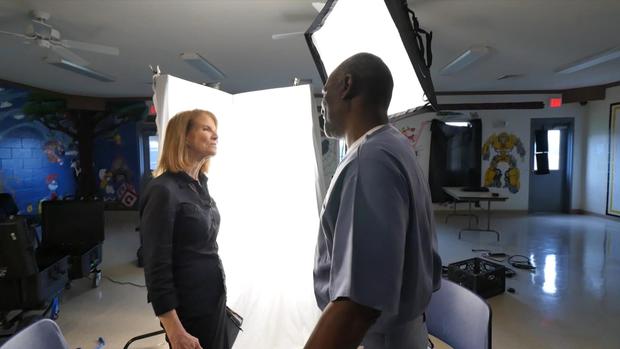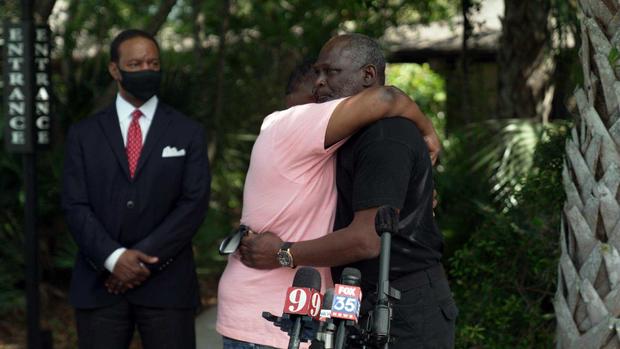Did a young white woman cause a wrongful conviction by blaming a murder on a "black guy"?
Correspondent Erin Moriarty and "48 Hours" take a deep look into the case of Crosley Green — a case that Moriarty has been covering for two decades and involves serious questions about whether Green was convicted on what his attorneys have referred to in court documents as a racial hoax. "Crosley Green's Hard Time."
It's a difficult concept to accept: that a person could get convicted of murder simply because someone claimed "a black guy did it." Yet that's what Crosley Green's attorneys say happened to him. They've told the courts that a racial hoax sent him to prison in Florida for nearly 31 years.
A racial hoax, according to writer Kathryn Russell-Brown, who popularized the term, is when someone blames a crime on another person because of his or her race, sometimes to cover up the fact that they themselves committed it. Racial hoaxes can harm people of any race, but the victims are most often African American men.
Russell-Brown cites numerous cases as examples: On October 23, 1989, Charles Stuart killed his pregnant wife in Boston and claimed a black man robbed and shot her. He even picked a black man, Willie Bennett, out of a lineup. But Stuart's story fell apart when his own brother accused him of the murder. Stuart committed suicide in January 1990.
Two and a half years later, in Milwaukee, Jesse Anderson stabbed his wife more than 20 times in a parking lot and claimed two black men had attacked them. As evidence, he gave police a cap emblazoned with a basketball team logo that he claimed he knocked off the head of one of the assailants. His story unraveled when the person who sold him the cap went to the police.
Perhaps the best-known example is the case of Susan Smith in South Carolina. In 1994, Smith put her two young sons in her car and drowned them by rolling the vehicle into a lake. Like Stuart and Anderson, she claimed she had been attacked by an armed black man who had hijacked her car. After a highly publicized manhunt, Smith finally confessed that she was the one who killed her own children.
Crosley Green's case has not been established as a racial hoax, although his attorneys have used that term in court filings. They say that Green was wrongly convicted of murder after a young white Florida woman claimed her ex-boyfriend was robbed and shot by a black man.
The fatal shooting occurred in the early morning hours of April 4, 1989, in Brevard County, Florida. Kim Hallock, 19, called 911 and claimed a black man had hijacked the truck of her ex-boyfriend, Chip Flynn, taken the couple to a citrus grove and then shot Flynn. Hallock told investigators that she had managed to escape by jumping in the truck and driving away.
Hallock was not viewed as a possible suspect, even though her account contained several inconsistencies. She described the assailant's gun as resembling a semi-automatic, but no shell casings were found at the scene. She told an officer that the attacker ordered her to tie Flynn's hands, but later said in a taped statement that the "black man" did the tying. She admitted that she had been angry with Flynn because he was seeing a new girlfriend. And, even though the night was dark and moonless, Hallock, who said she didn't get a good look at the alleged assailant, managed to pick Crosley Green out of a photo lineup.
Green was charged with Flynn's murder even though there was no physical evidence that connected him. No weapon other than the victim's revolver was found. More troubling, prosecutors seemingly discounted the words of two first responders who believed Hallock herself was the shooter.
One of the former prosecutors in the case, Christopher White, said in a 2015 interview with "48 Hours," "I guess they [investigators] could have done more examination. I'll give you that, OK?" Yet White was adamant on the subject of Hallock: "I don't see how there's anything here concrete to tell anybody that Kim Hallock lied."
At trial, prosecutors produced three witnesses, all with legal problems of their own, who testified that Green had confessed to them. In September 1990, Crosley Green was convicted by an all-white jury. He has spent the past nearly 31 years in prison, including 19 years on death row.
Often, a racial hoax unravels before an innocent person is convicted. Green's attorneys contend that prosecutors simply accepted Hallock's story without properly investigating it and then pressured witnesses to testify against Green.
Convictions based on racial hoaxes are among the toughest to overturn. Once a fabricated story is accepted by jurors, it becomes a "fact" of the case to be repeated over and over again in appeals. Appellate courts generally overturn convictions based on mistakes of law, not fact. Crosley Green has said that if his were a case of mistaken identity, he would have been released by now. DNA tests would have proven his innocence.
But in this case, there is little evidence to suggest the existence of an unknown assailant at all. No weapon other than the victim's was found. There is no evidence that any weapon, other than the victim's, was fired at the scene that night. The single bullet that killed Chip Flynn was determined to be consistent with his own weapon. Crosley Green's fingerprints were not found anywhere inside or outside of the truck, although Flynn's and Hallock's were.
What does exist, say Green's attorneys, is evidence of prosecutorial misconduct, and in July 2018, a federal judge agreed. He overturned Green's conviction and ordered a new trial. That order was stayed, however, when the State of Florida appealed.
A ruling on the case by a panel of the 11th Circuit, U. S. Court of Appeals is expected later this year.
Today, with DNA and other forensic tests, racial hoaxes are harder to perpetrate. They were much easier to pull off in the past, and in communities where "playing the race card" could inflame racism and racial stereotypes that festered just below the surface.
If Crosley Green is a victim of a racial hoax, he has paid a terrible and unacceptable price. He was incarcerated when he was 31 years old. He turns 63 in September.
Hear the latest developments on Crosley Green's case on Erin Moriarty's "48 Hours" podcast, "Murder in the Orange Grove: The Troubled Case Against Crosley Green," available on all major podcast apps. For ad-free access, subscribe to 48 Hours+ on Apple Podcasts.







